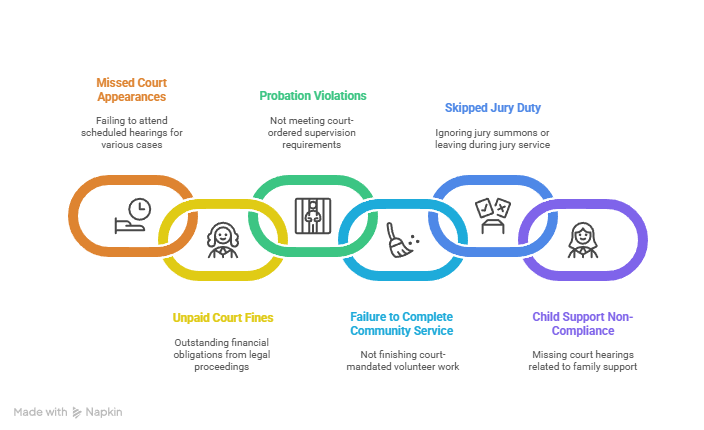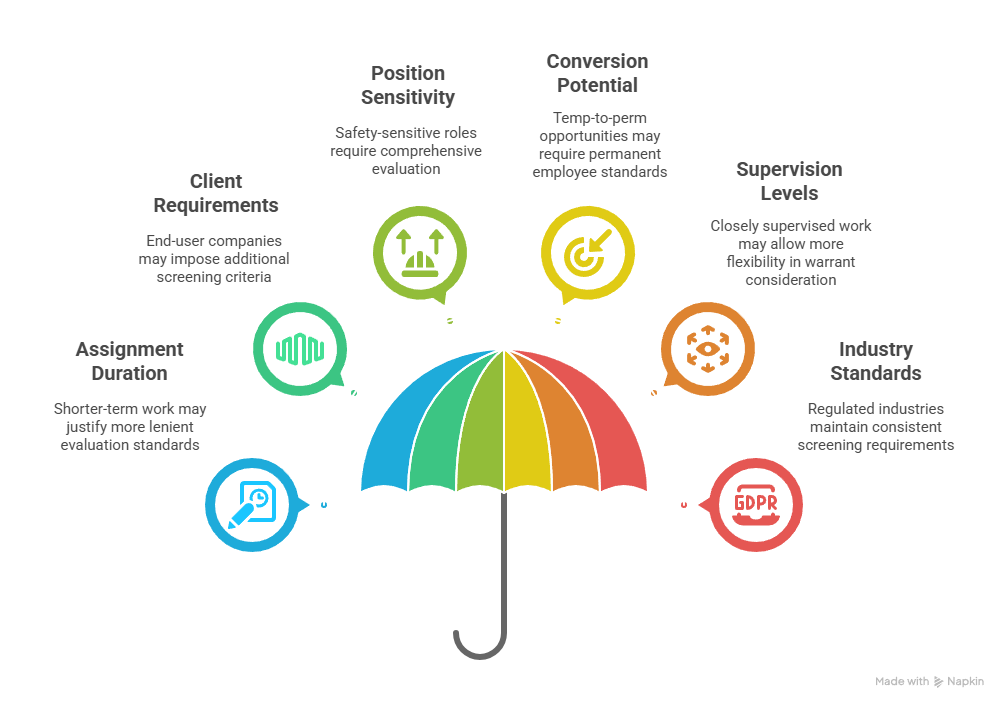A bench warrant on background check reports reveals outstanding court orders that can significantly impact hiring decisions and workplace safety. Employers conducting thorough employment screening processes must understand how these warrants appear in background checks and their implications for different positions within their organizations.
Key Takeaways
- Bench warrant on background check results indicates a person failed to appear in court for required proceedings or meet legal obligations
- Employment screening processes that include warrant searches help employers identify potential legal complications before making hiring decisions
- Outstanding bench warrant employment situations require careful evaluation based on position requirements, safety considerations, and company policies
- Employers can legally ask about pending legal matters during background check procedures, but must follow FCRA compliance guidelines
- Different types of bench warrants carry varying levels of concern for employment decisions, from minor traffic violations to serious criminal matters
- Professional background check services provide detailed warrant information that helps employers make informed hiring choices while maintaining legal compliance
Understanding What a Bench Warrant on Background Check Reports Means
A bench warrant on background check results represents a court order issued when someone fails to appear for a scheduled court proceeding. These legal documents authorize law enforcement to arrest the individual and bring them before the court. When employers conduct employment background checks, these warrants often appear as part of comprehensive screening processes that examine criminal history, court records, and outstanding legal obligations.
Bench warrants differ from arrest warrants because they stem from administrative failures rather than new criminal charges. The "bench" refers to the judge's seat in the courtroom. When someone misses a court date, pays a fine late, or fails to complete court-ordered requirements, judges issue these warrants to compel compliance.
Employment screening processes routinely uncover bench warrants through court record searches and criminal background investigations. These findings require careful evaluation to determine their impact on hiring decisions and workplace safety considerations. Modern background check systems scan thousands of court databases daily to identify outstanding warrants that could affect employment suitability.
The prevalence of bench warrant discoveries has increased significantly as background check technology improves and court systems digitize their records. Employers now receive more comprehensive warrant information than ever before, requiring enhanced evaluation procedures and decision-making frameworks to handle these findings appropriately during the hiring process.
How Background Check Companies Discover Warrant Information
Background check services discover bench warrant on background check reports through systematic court record searches across multiple jurisdictions. These searches examine county, state, and federal court systems to identify outstanding legal obligations. The screening process reveals warrant details including issue dates, originating courts, underlying charges, and current status.
Modern employment screening uses advanced databases that compile court records from thousands of jurisdictions. This comprehensive approach ensures employers receive complete information about candidates' legal histories and outstanding obligations. Technology advances have revolutionized warrant discovery capabilities, allowing background check companies to access previously unavailable court records and provide more comprehensive reporting than traditional manual search methods.
Common Reasons Why a Bench Warrant on Background Check Appears
Employment background checks reveal various situations that lead to bench warrant issuance. Understanding these circumstances helps employers assess the severity and relevance of outstanding warrants during their screening process. Different underlying causes require different levels of concern and evaluation approaches.
Typical situations causing bench warrant on background check reports:

- Missed court appearances: Failing to attend scheduled hearings for traffic, criminal, or civil cases
- Unpaid court fines: Outstanding financial obligations from previous legal proceedings
- Probation violations: Not meeting court-ordered supervision requirements or conditions
- Failure to complete community service: Not finishing court-mandated volunteer work within specified timeframes
- Skipped jury duty: Ignoring jury summons or leaving during jury service without permission
- Child support non-compliance: Missing court hearings related to family support obligations
Each situation carries different implications for employment decisions. Traffic-related warrants may have minimal impact on most positions, while criminal case warrants raise more serious concerns about reliability and legal compliance.
Administrative warrants often result from simple oversights or communication failures rather than intentional non-compliance. Court systems frequently experience notification problems, address changes, or scheduling conflicts that contribute to warrant issuance without malicious intent from the individual involved.
Legal Implications When Bench Warrant on Background Check Results Appear
Employers must navigate complex legal requirements when bench warrant on background check reports influences hiring decisions. The Fair Credit Reporting Act (FCRA) establishes specific procedures for using background check information in employment choices. These regulations protect job candidates while allowing employers to make informed decisions about workplace safety and legal compliance.
FCRA compliance requires employers to provide proper notices, obtain candidate consent, and follow specific procedures when adverse employment actions result from background check findings. Bench warrant discoveries must be handled according to these established protocols to avoid legal complications and potential discrimination claims.
State and local laws may impose additional restrictions on how employers can use criminal history information in hiring decisions. Some jurisdictions limit consideration of certain types of warrants or require individualized assessments of their relevance to specific positions.
Required FCRA compliance steps:
- Pre-adverse action notice: Provide candidate with background check report and summary of rights
- Reasonable waiting period: Allow time for candidate response or dispute filing
- Individualized assessment: Consider warrant relevance to specific job requirements
- Adverse action notice: Provide formal notification if employment is denied based on warrant information
- Record retention: Maintain documentation of decision-making process and compliance efforts
These procedures protect candidates from unfair treatment while allowing employers to make necessary safety and compliance decisions. Proper documentation of the screening process helps defend against potential legal challenges and demonstrates good faith efforts to comply with applicable laws.
State Law Variations in Warrant Consideration
Different states impose varying restrictions on how employers can consider bench warrant on background check information during the hiring process. Some jurisdictions provide broad employer discretion, while others require specific justifications for warrant-related employment decisions.
State law considerations include:
- Ban-the-box legislation: Limits initial criminal history inquiries in some states
- Individualized assessment requirements: Mandates case-by-case evaluation of warrant relevance
- Look-back period restrictions: Limits consideration of older warrants or resolved cases
- Position-specific relevance standards: Requires connection between warrant and job duties
- Rehabilitation evidence: Allows candidates to present mitigating circumstances
California's Fair Chance Act, New York's Article 23-A, and similar laws in other states require employers to consider factors beyond the mere existence of warrant information. These factors include the nature of the underlying offense, time elapsed since warrant issuance, and evidence of rehabilitation or resolution efforts.
Risk Assessment When Bench Warrant on Background Check Reports Surface
Employment screening processes must evaluate bench warrant on background check findings within the context of specific job requirements and organizational risk tolerance. Risk assessment involves examining the nature of the underlying charge, the time elapsed since warrant issuance, and the relevance to job duties while applying consistent standards across similar positions.
Different position types require varying levels of scrutiny when evaluating warrant findings. Administrative positions may allow more flexibility in warrant consideration, while safety-sensitive roles demand comprehensive evaluation of any outstanding legal obligations.
| Position Type | Warrant Consideration | Decision Factors | Resolution Requirements |
| Administrative | Case-by-case evaluation | Job relevance, timing, severity | Voluntary resolution encouraged |
| Customer Service | Public interaction concerns | Trust, reliability factors | May require active resolution |
| Management | Leadership responsibilities | Integrity, decision-making | Higher standards expected |
Employers should establish clear policies for warrant evaluation that consider position requirements, organizational values, and legal compliance obligations. Market conditions and labor availability also influence how employers evaluate warrant information, with tight labor markets potentially resulting in more flexible warrant consideration.
Safety-Sensitive Positions and Warrant Evaluation
Certain employment roles carry heightened safety responsibilities that require stricter evaluation of bench warrant on background check findings. These positions involve public safety, vulnerable populations, or high-security environments where outstanding legal obligations could pose significant risks.
Safety-sensitive roles requiring enhanced background checks:

- Transportation positions: Commercial drivers, pilots, and equipment operators facing DOT regulations
- Healthcare roles: Direct patient care, pharmaceutical access, or medical device operation
- Financial services: Cash handling, account access, or fiduciary responsibilities
- Security positions: Law enforcement, private security, or facility protection duties
- Education roles: Direct supervision of children or access to sensitive school information
- Government positions: Security clearance requirements or public trust responsibilities
These positions may justify excluding candidates with certain types of outstanding bench warrant on background check results, even for relatively minor underlying charges. The screening process must document the connection between warrant information and job-specific safety requirements to support employment decisions.
Industry-Specific Standards for Bench Warrant on Background Check Evaluation
Different industries maintain varying standards for bench warrant on background check consideration during employment screening. Regulated sectors like healthcare, finance, and transportation face specific legal requirements that influence how warrant information affects hiring decisions.
Healthcare employers face strict regulatory requirements when hiring staff with access to patients, controlled substances, or sensitive medical information. Outstanding bench warrant on background check results can trigger additional scrutiny from licensing boards and regulatory agencies overseeing healthcare facilities.
Healthcare-specific warrant concerns:
- Patient safety implications: Outstanding legal obligations may indicate reliability issues affecting care quality
- Controlled substance access: DEA regulations require strict background screening for drug access and handling
- Professional licensing impact: State boards may suspend licenses for unresolved legal matters or compliance failures
- Regulatory compliance: Medicare, Medicaid, and other programs impose screening requirements for provider participation
- Liability considerations: Negligent hiring claims related to patient harm or facility violations
- Credentialing requirements: Hospital medical staff appointments require comprehensive background verification
Financial institutions and transportation companies face federal and state regulations requiring comprehensive background checks for employees in safety-sensitive or fiduciary positions. DOT regulations impose strict warrant evaluation standards for transportation workers, while banking agencies require comprehensive employee screening for institutional safety.
Transportation and Financial Services Requirements
Transportation companies face particular challenges with warrant evaluation due to strict DOT safety regulations and public safety responsibilities. Financial institutions must comply with FDIC, OCC, and state banking requirements that influence how warrant information affects employment decisions.
Industry-specific evaluation factors:
- DOT regulations: Transportation workers face strict warrant evaluation standards for safety compliance
- FDIC and OCC requirements: Banking agencies require comprehensive employee screening for institutional safety
- State licensing mandates: Professional licenses may be affected by warrant findings and resolution status
- Insurance implications: Carrier requirements may influence warrant consideration policies and procedures
- Customer trust factors: Outstanding legal obligations could undermine client confidence and business relationships
- Regulatory examination impact: Supervisors review employee screening procedures during institutional examinations
Professional licensing requirements add another layer of complexity to warrant evaluation in regulated industries. State boards may suspend or revoke licenses based on outstanding warrants, creating employment complications even after hiring decisions are made.
Candidate Rights When Bench Warrant on Background Check Appears
Job candidates maintain specific rights when bench warrant on background check results influences employment decisions. The Fair Credit Reporting Act provides fundamental protections, including the right to receive copies of background reports, dispute inaccurate information, and understand how warrant findings affect hiring choices.
Candidates can request additional background check information, provide context about warrant circumstances, and present evidence of efforts to resolve outstanding legal obligations. The screening process should accommodate these candidate rights while maintaining employer prerogatives to evaluate legal compliance and workplace safety considerations effectively.
Pre-adverse action procedures include:
- Background check report provision: Supply candidate with complete background report copy showing warrant details
- Summary of rights notice: Provide FCRA-required consumer rights summary explaining dispute options
- Reasonable time allowance: Give candidate opportunity to review and respond to warrant findings
- Dispute process information: Explain how to challenge inaccurate warrant information through proper channels
- Contact information provision: Supply background check company details for direct dispute communication
This process allows candidates to identify reporting errors, provide context about warrant circumstances, or present evidence of resolution efforts. Employers must complete these steps before making final adverse employment decisions based on background check findings involving warrant information.
Candidate Response and Explanation Opportunities
Background check procedures must provide candidates reasonable opportunities to explain bench warrant on background check circumstances and present mitigating information. These explanations help employers make informed decisions while ensuring fair consideration of individual situations.
Common candidate explanations for warrant findings:
- Administrative errors: Court scheduling mistakes or notification failures causing missed appearances
- Resolution in progress: Active efforts to address outstanding warrant obligations through legal counsel
- Circumstances beyond control: Medical emergencies or family crises causing court absences
- Legal representation: Attorney involvement in resolving warrant issues and court compliance
- Payment arrangements: Established plans for addressing financial obligations to resolve warrants
- Mistaken identity: Cases where warrant belongs to different individual with similar identifying information
The employment screening process should evaluate these explanations fairly while maintaining consistent standards across similar positions. Documentation of candidate responses and employer evaluation helps support final hiring decisions and demonstrates good faith consideration of individual circumstances.
Best Practices for Managing Bench Warrant on Background Check Findings
Effective employment screening processes require clear policies and consistent procedures for evaluating bench warrant on background check information discovered during candidate evaluation. Best practices help employers make fair, legally compliant decisions while protecting organizational interests and maintaining workplace safety standards.
Successful warrant evaluation programs establish clear criteria for decision-making, provide training for hiring personnel, and maintain detailed documentation of the screening process. Regular policy reviews ensure continued compliance with evolving legal requirements and industry best practices for background check management.
Essential policy components for warrant evaluation:
- Evaluation criteria: Specific factors for assessing warrant relevance and severity levels
- Position-specific standards: Different requirements based on job duties and safety considerations
- Time limitations: How long outstanding warrants remain relevant for employment purposes
- Candidate communication procedures: Required notices and explanation opportunities during screening
- Documentation requirements: Record-keeping standards for warrant-related employment decisions
- Appeal processes: Internal procedures for candidates to challenge adverse hiring decisions
Well-developed policies ensure consistent treatment of candidates while supporting defensible employment decisions based on background check results. Regular training helps hiring personnel understand and implement these policies effectively throughout the screening process.
Documentation and Record-Keeping for Warrant Cases
Comprehensive documentation supports warrant-related employment decisions and demonstrates compliance with legal requirements during the screening process. Proper record-keeping helps defend against potential discrimination claims and regulatory enforcement actions related to background check practices.
| Documentation Type | Required Elements | Retention Period | Legal Purpose |
| Background Reports | Complete warrant details and search results | 7 years minimum | FCRA compliance evidence |
| Evaluation Records | Decision criteria and assessment factors | 3 years minimum | Consistent policy application |
| Candidate Communications | All warrant-related correspondence | 5 years minimum | Due process documentation |
Record retention policies should comply with applicable legal requirements while supporting potential future litigation defense needs. Training programs should educate personnel on proper documentation standards and record-keeping requirements for warrant-related employment decisions.
Impact of Bench Warrant on Background Check for Different Employment Scenarios
Understanding how bench warrant on background check findings affect various employment situations helps both employers and job seekers navigate the hiring process effectively. Different scenarios require different approaches to warrant evaluation, from entry-level positions to executive roles.
The employment screening process varies significantly based on position level, industry requirements, and organizational risk tolerance. Entry-level positions may have more lenient standards for minor warrant issues, while senior roles require more comprehensive evaluation of any legal complications.
Executive positions require enhanced scrutiny of bench warrant on background check results due to leadership responsibilities, fiduciary duties, and organizational reputation considerations. Executive roles typically involve comprehensive background checks that examine all aspects of legal history.
Executive screening considerations include:
- Fiduciary responsibilities: Outstanding legal obligations may conflict with financial oversight duties
- Organizational reputation: Executive legal issues can affect company credibility and stakeholder confidence
- Regulatory oversight: Some industries require executive background disclosure to regulatory bodies
- Board governance: Directors and officers may face additional scrutiny from corporate governance requirements
- Public relations impact: Executive legal issues may attract media attention affecting organizational image
- Insurance considerations: Executive liability coverage may be affected by outstanding legal obligations
The background check process for executive positions typically includes extended warrant searches, enhanced verification procedures, and ongoing monitoring for new legal developments during employment tenure.
Temporary and Contract Employment Considerations
Temporary positions and contract work may have different standards for evaluating bench warrant on background check findings compared to permanent employment opportunities. Some organizations accept higher risk levels for short-term arrangements while maintaining comprehensive screening for long-term commitments.
Factors affecting temporary employment decisions:

- Assignment duration: Shorter-term work may justify more lenient warrant evaluation standards
- Client requirements: End-user companies may impose additional screening criteria beyond agency standards
- Position sensitivity: Safety-sensitive or high-security temporary roles require comprehensive warrant evaluation
- Conversion potential: Temp-to-perm opportunities may require meeting permanent employee screening standards
- Supervision levels: Closely supervised temporary work may allow more flexibility in warrant consideration
- Industry standards: Regulated industries maintain consistent screening requirements regardless of employment type
Background check procedures for temporary employment should clearly communicate screening standards and potential conversion requirements to ensure candidate understanding and compliance with varying organizational policies.
Resolution Strategies for Outstanding Warrants
Job seekers discovering bench warrant on background check results should take immediate action to resolve outstanding legal obligations before they impact employment opportunities. Most warrants can be addressed through proper legal channels, and many employers view active resolution efforts favorably during the hiring process.
Different types of warrants require different resolution approaches, from simple fine payments to court appearances with legal representation for more serious underlying charges. The screening process often reveals warrant information that candidates were unaware of, particularly for older traffic violations or administrative matters.
Complex warrant situations benefit from legal representation to ensure proper resolution and minimize employment impact. Attorneys specializing in criminal law or traffic violations can navigate court procedures, negotiate resolution terms, and ensure compliance with all legal requirements affecting warrant status.
Benefits of legal representation for warrant resolution:
- Court procedure navigation: Attorneys understand filing requirements and procedural deadlines
- Negotiation expertise: Legal counsel can often secure favorable resolution terms and reduced penalties
- Efficient processing: Professional relationships may expedite warrant resolution through proper channels
- Compliance assurance: Attorneys ensure all legal requirements are met to prevent future complications
- Documentation assistance: Proper legal records help demonstrate resolution to employers during background checks
- Rights protection: Legal representation ensures candidates understand their rights throughout the resolution process
Employment candidates should seek legal consultation promptly upon discovering warrant issues to minimize potential impact on job opportunities and ensure proper resolution procedures.
Documentation of Resolution Efforts
Candidates should maintain comprehensive documentation of warrant resolution efforts to present to potential employers during the background check process. This documentation demonstrates responsibility, proactive behavior, and commitment to legal compliance that may positively influence hiring decisions.
Essential resolution documentation includes:
- Court filing receipts: Evidence of proper legal submissions and procedural compliance
- Payment confirmations: Documentation of fine payments, court costs, and other financial obligations
- Attorney correspondence: Letters showing legal representation and professional resolution efforts
- Court appearance records: Documentation of hearing attendance and compliance with court orders
- Completion certificates: Evidence of community service, classes, or other court-ordered requirements
- Case closure documents: Final court orders showing warrant resolution and case completion
This documentation should be organized chronologically and made available to potential employers upon request during the screening process. Digital copies should be maintained for easy sharing during employment applications and background check discussions.
Conclusion
Understanding how bench warrant on background check results affect employment decisions requires knowledge of legal requirements, industry standards, and organizational policies governing hiring practices. Employers must balance candidate rights with workplace safety and legal compliance obligations while maintaining consistent, fair evaluation procedures for all applicants. Job seekers benefit from understanding the screening process, their legal rights, and effective strategies for addressing outstanding legal obligations discovered during employment background checks. Success in managing warrant-related employment issues requires proactive resolution of outstanding legal obligations, clear communication about circumstances, and demonstrated commitment to legal compliance.
Frequently Asked Questions
Will a bench warrant on background check automatically disqualify me from employment?
A bench warrant on background check results does not automatically disqualify candidates from employment, as the impact depends on the underlying charge, position requirements, and employer policies. Many employers conduct individualized assessments during the screening process, considering factors like warrant age, severity, and relevance to job duties before making hiring decisions based on background check findings.
How long does a bench warrant on background check affect employment opportunities?
Bench warrants on background check reports typically remain visible indefinitely until resolved through the court system, as they represent active legal obligations rather than historical events. The employment impact may decrease over time for minor warrants, but employers can legally consider outstanding warrants regardless of age during their screening process and hiring evaluations.
Can I get hired if employers find a bench warrant on background check reports?
Employment with bench warrant on background check findings is possible, depending on the employer's policies, position requirements, and warrant circumstances. Many employers focus on warrant relevance to job duties during their screening process, allowing employment for administrative positions while restricting safety-sensitive roles with outstanding legal obligations requiring resolution.
Do employers have to tell me if a bench warrant on background check caused rejection?
Federal law requires employers to provide pre-adverse action notice when background check information, including bench warrant findings, may result in employment denial. This process includes providing the background check report, allowing response time, and sending formal adverse action notices if employment is denied based on screening results showing outstanding warrants.
What should I do if a bench warrant on background check appears incorrectly?
Candidates discovering incorrect bench warrant on background check information should immediately contact the background screening company to dispute inaccurate findings while simultaneously verifying court records directly. The dispute process includes providing documentation of warrant resolution or evidence of mistaken identity, and employers must consider updated information before making final hiring decisions.
Can employers ask about bench warrants before running background checks?
Employers can generally ask about outstanding warrants and pending legal matters during the application process, though some states restrict initial criminal history inquiries through ban-the-box legislation. However, most employers discover bench warrant information through background check procedures rather than direct questioning, as candidates may not be aware of outstanding warrants.
Additional Resources
- Fair Credit Reporting Act Compliance Guide for Employers
https://www.ftc.gov/business-guidance/resources/using-consumer-reports-what-employers-need-know - Society for Human Resource Management Background Check Guidelines
https://www.shrm.org/topics-tools/tools/toolkits/background-checks - Equal Employment Opportunity Commission Criminal Record Guidance
https://www.eeoc.gov/newsroom/eeoc-issues-enforcement-guidance-criminal-records - National Association of Professional Background Screeners Best Practices
https://www.napbs.com/background-screening-best-practices - U.S. Department of Labor Hiring Guidelines and Background Screening
https://www.dol.gov/general/jobs/background-checks - National Consumer Law Center Background Check Resources
https://www.nclc.org/resources/background-checks - Workplace Fairness Employment Background Check Guide
https://www.workplacefairness.org/background-checks

GCheck Editorial Team
Meet the GCheck Editorial Team, your trusted source for insightful and up-to-date information in the world of employment background checks. Committed to delivering the latest trends, best practices, and industry insights, our team is dedicated to keeping you informed.
With a passion for ensuring accuracy, compliance, and efficiency in background screening, we are your go-to experts in the field. Stay tuned for our comprehensive articles, guides, and analysis, designed to empower businesses and individuals with the knowledge they need to make informed decisions.
At GCheck, we're here to guide you through the complexities of background checks, every step of the way.






